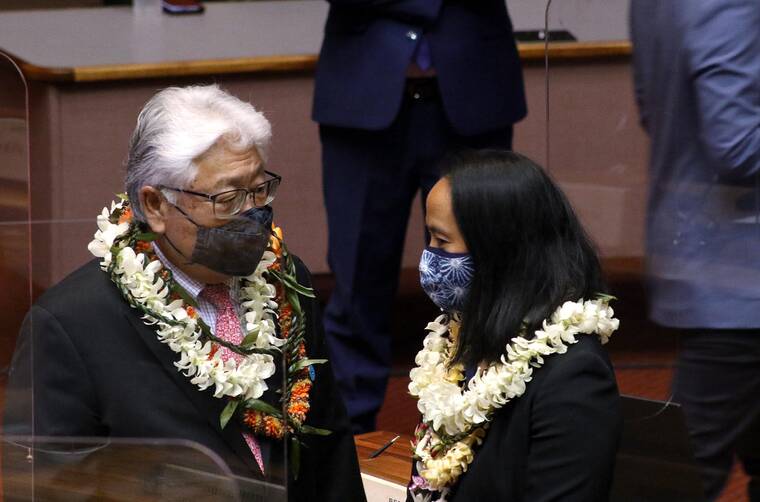HONOLULU — Hawaii lawmakers opened a new session of the Legislature on Wednesday with House leaders proposing to raise the state’s minimum wage to $18 an hour and spend $600 million on housing for Native Hawaiians on the waiting list for Hawaiian homelands.
The highest state minimum wage is currently $15 in California, according to the National Conference of State Legislatures.
House Speaker Scott Saiki, a Democrat, said minimum wage increase would be phased in over several years. The existing minimum is $10.10.
House majority leaders also want to increase the food tax credit and make the earned income tax credit refundable and permanent, Saiki said in a speech on the House floor.
Saiki recalled lawmakers initially brought forward these proposals in 2020 after a report by Aloha United Way showed 47% of Hawaii’s families were financially distressed and “simply could not make it here.” But he said COVID-19 disrupted plans to pass the measures that year.
“Well, conditions have improved and it is time for us to act,” Saiki said.
Senate President Ron Kouchi, a Democrat, told reporters he was encouraged that House leaders proposed a number for a new minimum wage.
“We will certainly entertain that and get the testimony to see what would work,” he said.
He said the only potential twist to the dollar amount would be whether lawmakers also pass measures on the earned income tax credit and food tax credit.
Kouchi said he wanted to make sure the benefits go to families with the lowest incomes.
Minimum wage increase proposals in past years have encountered opposition from Hawaii businesses.
State Rep. Sylvia Luke, the chairperson of the House Finance Committee, said $600 million proposed for Hawaiian Homelands would be a one-time payment to a trust fund.
She said lawmakers would work with members of the Hawaiian caucus and with Native Hawaiian organizations to determine the best way to use the money to “get as many Native Hawaiians on the wait list a place they can call home.”
Jacob Aki, a spokesperson for the Senate, said the Senate Hawaiian Caucus was looking at submitting similar legislation. He said the Senate was open to considering the House’s proposal.
The office of Hawaii Gov. David Ige did not immediately respond to questions about whether he would support the minimum wage increase or $600 million for Hawaiian homelands.
The Hawaiian Homes Commission Act of 1920 allows people with at least 50% Hawaiian blood to apply for a 99-year homestead lease costing $1 a year. But there are more than 20,000 people on the waiting list for such leases.
Kouchi said Hawaii needed to boost mental health services, help for homeless individuals and affordable housing.
“With all of the problems that we were trying to tackle pre-Covid, Covid has only made them worse,” Kouchi said in a speech.
The 2022 session is the first since the Hawaii Supreme Court in November ruled against the “gut and replace” tactic lawmakers have long used to change the contents of legislation at the last minute without allowing time for public comment.
Government watchdog groups have expressed hope the court’s ruling will restore trust in the legislative process.
This year is an election year, with the public due to vote for a new governor and lieutenant governor in November. Voters will also be asked to cast ballots for all 25 Senate seats and 51 House seats.
The House and Senate observed opening day without the presence of the public for the second year in a row after surging COVID-19 cases prompted lawmakers to close the Capitol to prevent the spread of coronavirus.
Lawmakers initially expected to open the Capitol to the public at the beginning of the year, but a jump in cases upended those plans. Lawmakers aim to reevaluate the closure in coming weeks.
Floor sessions and committee hearings will be streamed online. Testimony will be accepted via Zoom and online through the Legislature’s website. The 60-day session is scheduled to end on May 5.






